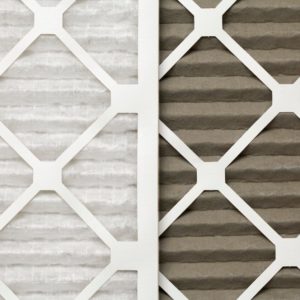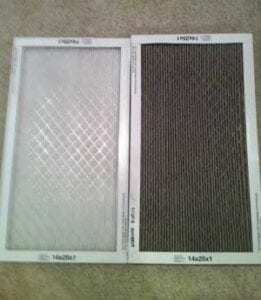

Home air filters are the lungs of your home: they keep the bad stuff from entering into your home so the air you breathe indoors is as sweet and delicious as it can be. You want them to be highly effective.
Home air filters, though, tend not to get much attention once they are in place. Mostly because they are hidden away and you don’t think about the vital role they play in safeguarding your home’s air.
Furthermore, you may not have thought much about the actual filter in your home and whether it’s as effective as you need it to be.
Rating your home air filters with MERV
Did you know that there are different types of filters available and that there’s a rating system for determining the best filter for your home? In fact, every central air filter has a MERV rating, which measures how efficiently the filter captures pollutants that pass through your heating and cooling system. These ratings range from 1 (least efficient) to 16 (extremely efficient).
The more you understand about air filter ratings, the better you can ensure that the lungs of your home are healthy and working hard for you, your family and your home.
According to the Asthma and Allergy Foundation of America (AAFA), eight of 10 Americans are exposed to house dust mites, and six of 10, to cat or dog dander. To help safeguard your family from these micro-menaces, you need an effective air filter. One of the best means of determining an air filter’s effectiveness is MERV.
What is MERV and how does it indicate home air filter effectiveness?
MERV, which stands for Minimum Efficiency Reporting Value, is essentially a number that rates your air filter’s effectiveness. The ratings scale was introduced in 1987 by the American Society of Heating, Refrigerating and Air-Conditioning Engineers (ASHRAE) trade organization. The higher the MERV rating, the greater the filtration level and the harder it is for particles to eek their way through the filter into your living space.

For example, an air filter with a MERV rating of 4 can capture some of the largest culprits — pollen, sanding dust, carpet fibers — but miss out on the smallest of threats — mold spores and bacteria.
According to the EPA, “medium-efficiency filters with a MERV of 5 to 13 are reasonably efficient at removing small to large airborne particles.” Other studies show that medium-efficiency filters — in the MERV 7 to 12 range — strike the best balance between removing allergens and filter cost. Higher-rated filters are typically designed for hospital and industrial settings and are rarely found in homes.
As a result, knowing your air filter’s MERV rating means knowing whether it can capture that itchy-eye-inducing cat dander or that unidentified bug your son brought home from school. Naturally, you’ll pay more for each successive step up the MERV ratings ladder.
Effective air filters mean efficient home energy systems
Choosing a proper air filter can also mean saving money on energy and equipment costs. While common sense might suggest that the highest MERV rating is best, this approach can backfire from the standpoint of system performance and cost.
To operate well, a heating or cooling system needs to have the proper volume of air flow. But for the higher-rated air filters to capture mold spores, bacteria and other tiny particles, their pores need to be very small. Smaller pores restrict airflow, which can put a strain on your heating and cooling system and drive up energy costs and equipment stress.
The trick is to make sure your filter is properly rated for the blower capacity of your furnace. Again, if the air flow is too high or too low, it may make the home less comfortable and increase utility bills. (For more effective filter options, talk to a heating specialist.)
Therefore, keep “Uncle” MERV in mind when purchasing home air filters, so that you select the highest-rated filter that will work for your heating and cooling system and save long-term cash. More importantly, air filters ultimately impact what you and your family will be breathing in on a daily basis, and that is not something to ignore.
What MERV rating do you prefer for your air filters? Let us know in the comments.




